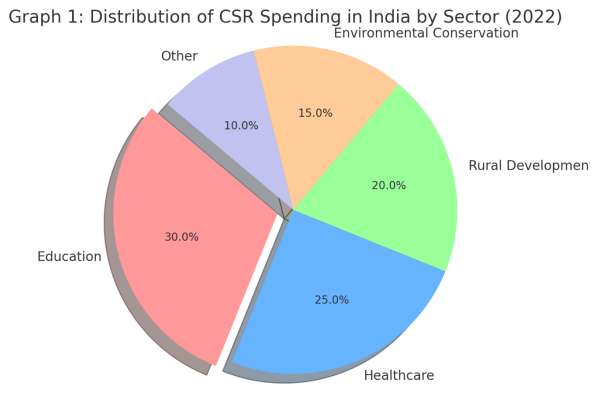Corporate Social Responsibility as a Tool for Government Accountability, its impact on Corporate Operations and the Financial Ecosystem in India

Submission to VIJ 2024-11-19
Keywords
- Corporate Social Responsibility ,
- Tool for Government Accountability
Copyright (c) 2024 Hriday Bijlani

This work is licensed under a Creative Commons Attribution 4.0 International License.
Abstract
This paper examines the multifaceted impact of Corporate Social Responsibility (CSR) on brand value and metrics, government accountability, and consumer behavior upon the introduction of the Companies Act in 2013, which mandated CSR for certain companies in India. Quantitative research methods were utilized to capture the public perception of CSR and companies that engage in it, aided by an online survey targeting Indian consumers. This paper also includes an exploratory analysis of Tata Consultancy Services’ financial metrics from 2012 to 2016 to assess potential relationships between CSR and brand value. The aim is to identify preliminary patterns that may warrant further investigation with a larger sample size. A qualitative case study on Infosys Foundation's rural development programs ties together the phenomena of corporate CSR and Government policy change in India. The TCS analysis reveals a broadly positive association between CSR and brand value, indicating that while CSR isn’t the sole contributor it plays a vital role in the perceived value of a company. These studies highlight that CSR has had an overall favorable impact on the relationship between corporations and the government, as well as corporate operations and public welfare.
References
- Bhaduri, S. N., & Selarka, E. (2016). Corporate governance and corporate social responsibility of Indian companies. Springer Singapore.
- Baxi, C. V., & Ray, R. S. (2012). Corporate social responsibility. Vikas Publishing House.
- Gautam, R., & Singh, A. (2010). Corporate social responsibility practices in India: A study of top 500 companies. Global Business and Management Research: An International Journal, 2(1), 41-56.
- Subramaniam, N., Kansal, M., Mihret, D. G., & Babu, S. (2019). Outsourcing mandated corporate social responsibility in India: risks and performance. Journal of Accounting & Organizational Change, 15(3), 453-472.
- Palakshappa, N., & Chatterji, M. (2014). Corporate social responsibility in the Indian context. In Corporate social responsibility and sustainability: emerging trends in developing economies (pp. 139-162). Emerald Group Publishing Limited.
- Poddar, A., Narula, S. A., & Zutshi, A. (2019). A study of corporate social responsibility practices of the top Bombay Stock Exchange 500 companies in India and their alignment with the Sustainable Development Goal s. Corporate Social Responsibility and Environmental Management, 26(6), 1184-1205.
- Sarkar, A. N. (2013). Review of strategic policy framework for re-evaluating ‘CSR’programme impacts on the mining-affected areas in India. In International business, sustainability and corporate social responsibility (pp. 217-261). Emerald Group Publishing Limited.
- Kanji, R., & Agrawal, R. (2020). Exploring the use of corporate social responsibility in building disaster resilience through sustainable development in India: An interpretive structural modelling approach. Progress in Disaster Science, 6, 100089.
- Narayanan, S., & Singh, G. A. (2024). Will legalizing corporate social responsibility get businesses to participate in welfare activities–the case of India. Society and Business Review, 19(1), 1-22.
- Narayan, P. S., Lal, N. K., Dutta, A., Mehta, T., Majumdar, A., Madhavan, A., ... & Sheel, R. (2012). Corporate social responsibility: Practice, theory, and challenges. Vikalpa, 37(2), 73-116.
- Scholtens, B. (2006). Finance as a driver of corporate social responsibility. Journal of business ethics, 68(1), 19-33.
- Zaman, R., Jain, T., Samara, G., & Jamali, D. (2022). Corporate governance meets corporate social responsibility: Mapping the interface. Business & Society, 61(3), 690-752.
- Mansi, M., Pandey, R., & Ghauri, E. (2017). CSR focus in the mission and vision statements of public sector enterprises: Evidence from India. Managerial Auditing Journal, 32(4/5), 356-377.
- Kumar, L. (2014). The impact of corporate social responsibility on sustainable development. Available at SSRN 2426049.
- Maqbool, S., & Zameer, M. N. (2018). Corporate social responsibility and financial performance: An empirical analysis of Indian banks. Future Business Journal, 4(1), 84-93.
- Parajuli, S., Rajbhandari, S., Joshi, A., Sujan, K. C., & Bhandari, U. (2019). Transforming corporate governance through effective corporate social responsibility (CSR) and social entrepreneurship orientation in Nepal. Quest Journal of Management and Social Sciences, 1(1), 26-49.
- Dobers, P., & Halme, M. (2009). Corporate social responsibility and developing countries. Corporate social responsibility and environmental management, 16(5), 237-249.
- Dhanesh, G. S. (2015). Why corporate social responsibility? An analysis of drivers of CSR in India. Management Communication Quarterly, 29(1), 114-129.
- Horrigan, B. (2010). Corporate social responsibility in the 21st century: Debates, models and practices across government, law and business. Edward Elgar Publishing.
- Rondinelli, D. A., & Berry, M. A. (2000). Environmental citizenship in multinational corporations: social responsibility and sustainable development. European Management Journal, 18(1), 70-84.